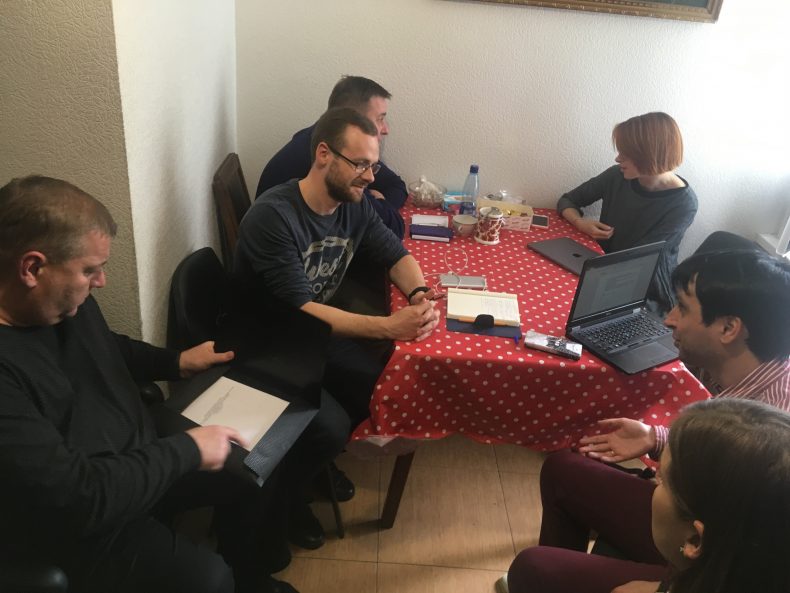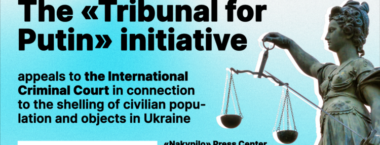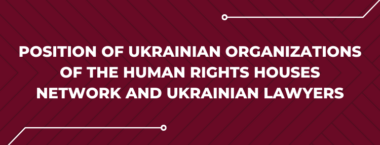On May 10, 2019, the UMDPL Association hosted a discussion of Recommendations for law enforcement officers on responses to attacks on LGBTQI activists during public events and to hate crimes committed on the grounds of sexual orientation and gender identity.
The document contains proposals on how the police should act in order to prevent violations of LQBTQI rights and freedoms, algorithms for police activities as well as recommendations on public monitoring of police activities. It’s a set of actions for officials of various structural units of law enforcement bodies in the field of communications, regulations, awareness and other aspects which should help reduce the number of attacks on representatives of the LGBTQI community and activists.
The event was attended by the authors of the document, A. Galay (UHHRU) and E. Krapyvin (UMDPL Association) as well as by representatives of the Social Action Center (O. Bondarenko, I. Fedorovych) and of the National Police of Ukraine (S. Maksymov from the Human Rights Department and M. Gulevych from the Department of Communications).
The conversation began with civil society representatives noting positive changes in police activities, such as actual interaction between police units and with the Ministry of Internal Affairs during the KyivPride event. The quality of their work during other public events has also improved, especially since 2019.
Nevertheless, there’s still the challenge of transforming best practices into a self-contained algorithm for law enforcement officers to rely on during all types of public events all over the country.
Human rights defenders stressed the need to create a kind of map of peaceful gatherings to account for all potential dangers. Law enforcement should help answer the following questions:
- Which police structural units get involved when a peaceful gathering is organized?
- What can/must be agreed on in advance with the organizers of public events?
- What happens the day before the event?
- How many beatings/assaults took place on the day of the event?
- What the police pays the most attention to before and during the event?
- Should the crimes that occurred near the event location be linked to the event itself?
One of the issues discussed during the meeting concerned the prospect of developing, without waiting for a dedicated law, guidelines for law enforcement on how to maintain order during public events. Police representatives dismissed this idea as redundant since the adoption of an appropriate law is already envisaged in the Action Plan to the National Human Rights Strategy 2020.

The second part of the meeting was dedicated to the response of law enforcement agencies to SOGI-related hate crimes. According to human rights defenders, there are certain factors that impair the effectiveness of investigations into homophobia-related crimes: thus, some of the information about a crime gets lost in the interval between its commission and the start of the investigation; investigators are unable to find a link between an event that took place the day before and the crime, etc. Police representatives’ response to this was that the issues with the investigation of crimes as hate crimes are the result of overworked pre-trial investigation bodies and the general lack of police officers on staff.
The publication’s authors offered their assistance with internal monitoring of police activities to ensure that they would follow the developed methodology.
Representatives of the National Police consider awareness-raising activities the best way to improve the effectiveness of law enforcement response to attacks on LGBTQI activists during public events and to SOGI-related hate crimes. Thus, police officers undergo monthly functional training online (National Police education website). The algorithms and recommendations prepared by experts should be presented to each police subdivision for study. This can be done by contacting their HR department and the appropriate deputy head of the National Police.
At the end of the meeting, the participants expressed their willingness to continue cooperation in order to improve the work of law enforcement officers in the above areas.
The discussion was conducted by the Ukrainian Helsinki Human Rights Union within the framework of the project “Countering radicalism and populism, protecting the rights of the LGBTQI community, organizations and initiative groups that protect LGBTQI rights and combat discrimination, through educational and advocacy activities”, supported by the Democracy Commission of the U.S. Embassy in Ukraine.




